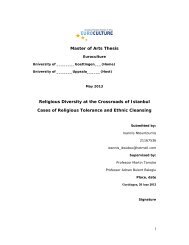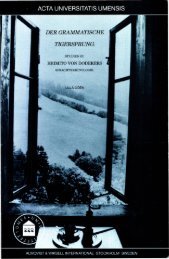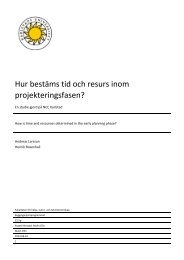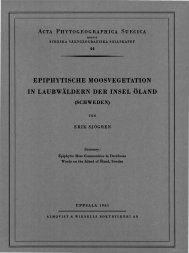fulltext - DiVA Portal
fulltext - DiVA Portal
fulltext - DiVA Portal
- No tags were found...
You also want an ePaper? Increase the reach of your titles
YUMPU automatically turns print PDFs into web optimized ePapers that Google loves.
The observations revealed that many features of practical work in pre-school canbe regarded as expressions of effectiveness and educationalization. The ambition ofthe pre-school teachers seemed to be to treat all children alike, to give them normsfor the behaviour in pre-school, and to organize group activities in which allchildren must participate. It was also usual that the pre-school teachers, especiallythose working in part-time groups, set the children tasks. The children could notdo anything else until this task had been performed satisfactorily. The pre-schoolteachers also seemed to think that it was very important that the children satsilently in a ring at the "assembly", and that they put up their hands beforespeaking. Cognitive training in a proper sense and concept formation wereprimarily carried out in more informal situations than the timetabled assemblies.This usually occured if the children were given practical supervision when theyasked for assistance with material for their play.The relation reflecion-action can be analysed on the basis of the pre-schoolteachers' notions and conceptions, and on the basis of certain conditions for thework.A pre-school teacher must stimulate the children and teach them something. Itis also her responsibility to make the children feel happy and to have fun, at thesame time that she must also take care that they do not hurt themselves during theplay. An example of how the teachers could handle such demands can be given. Inone of the groups the children were often alone, without adults, in the playingroom.Near-accidents often happened and there were many conflicts between thechildren, but the teacher very seldom intervened. The children were allowed to bein the playing-room if they asked the teacher's permission. But before they couldgo there,- they always had a period of "work" with set tasks. This pre-schoolteacher was the only adult in the group and she often organized activities thatrequired her guidance and instruction. In the interview she expressed the conceptionof play as a "therapeutic necessity". This conception is, among other things,characterized by the attitude that it is important that children can play withoutbeing disturbed by adults in order to get an outlet for their needs and feelings. Thisparticular conception helped her to cope with her situation with all the differentthings that were expected from her. By regarding play as "therapy", this teachercould get some extra time that she used to help indiviual children with their tasks.Thus, the children whom she did not devote her time to for the moment, were alsoassumed to satisfy important needs through their playing. This pre-school teacher'sconception of play legitimizes her behaviour in the group, she satisfies therequirements on pre-school teachers, and she satisfies the children's needs.The teachers in part-time groups are also expected to give the children anappropriate preparation for cumpulsory school. Both school and many parentsexpect the children to learn so-called basic concepts. The three teachers in part-timegroups in this study also expressed conceptions of learning in pre-school as"concept formation and intellectual training". However, their actions wereprimarily characterized by the conception of learning as "social training".This indicates that some of the pre-school teachers' conceptions agree withsome of the things that are demanded and expected from them. By tradition, theseteachers in part-time groups are, to a greater extent than teachers in day nurseries,expected to be pre-school teachers. At the same time they are also expected not tobe teachers, not to be like teachers in compulsory school.188
















